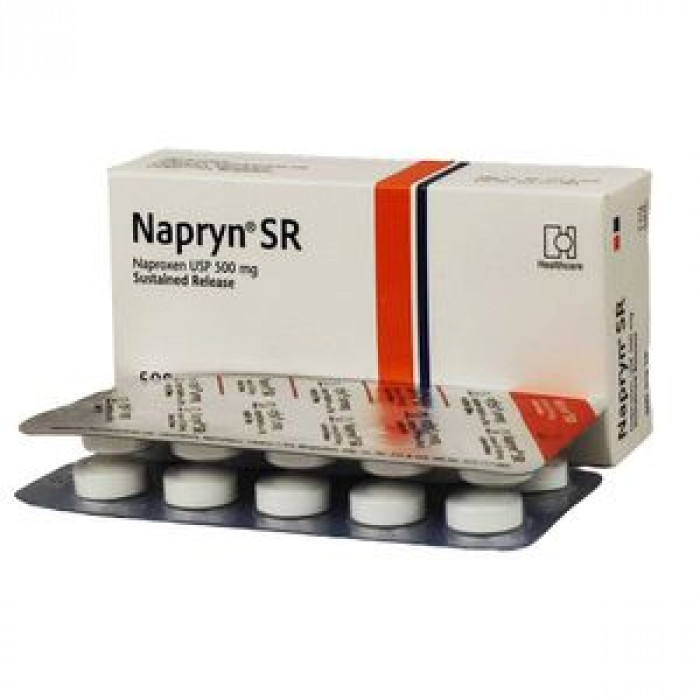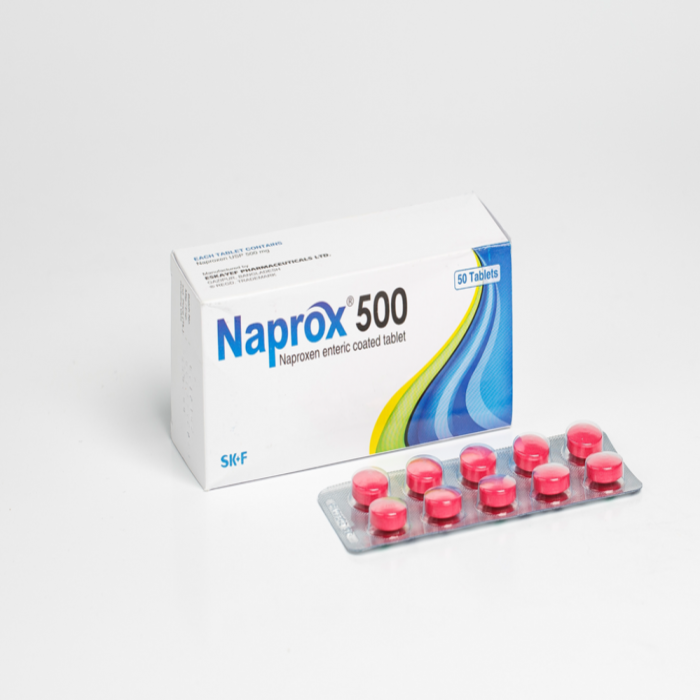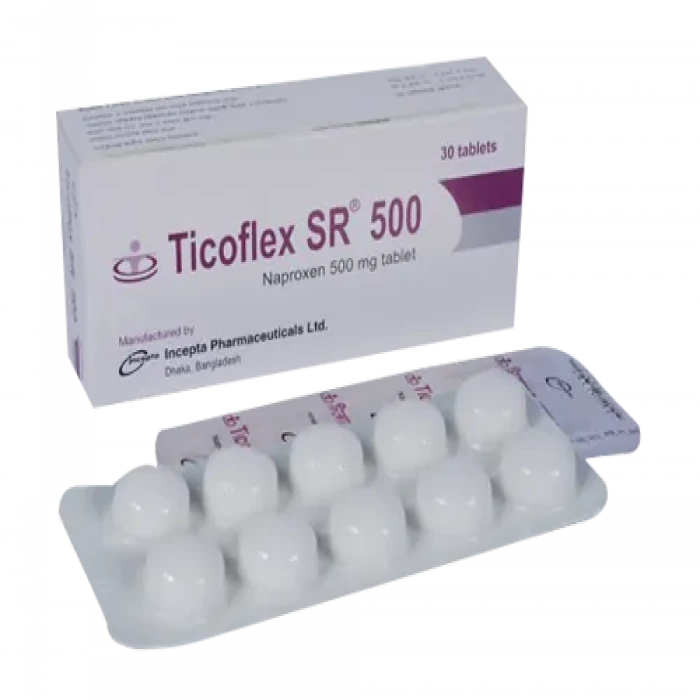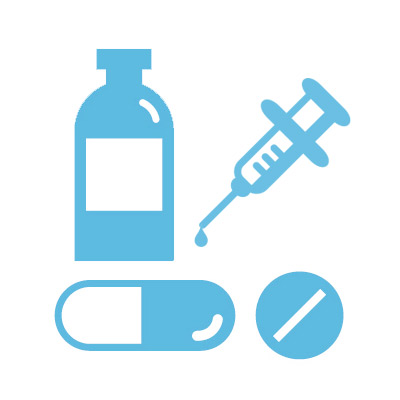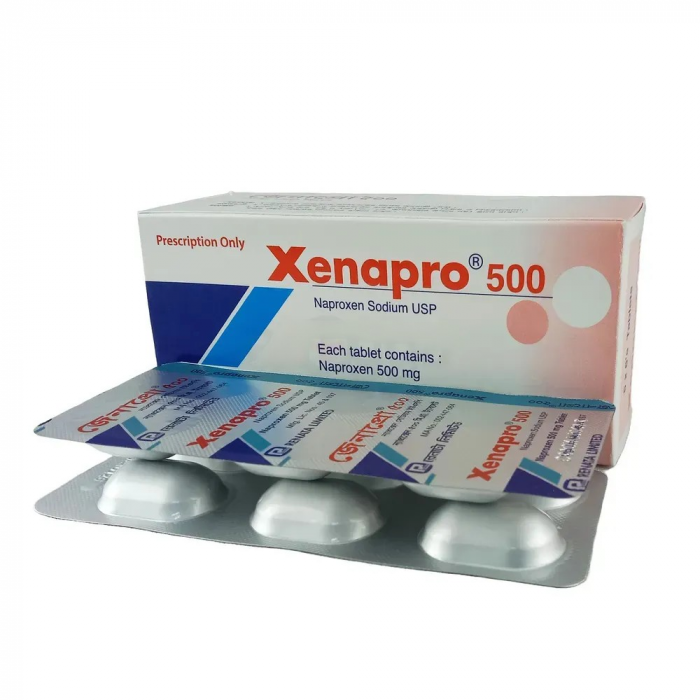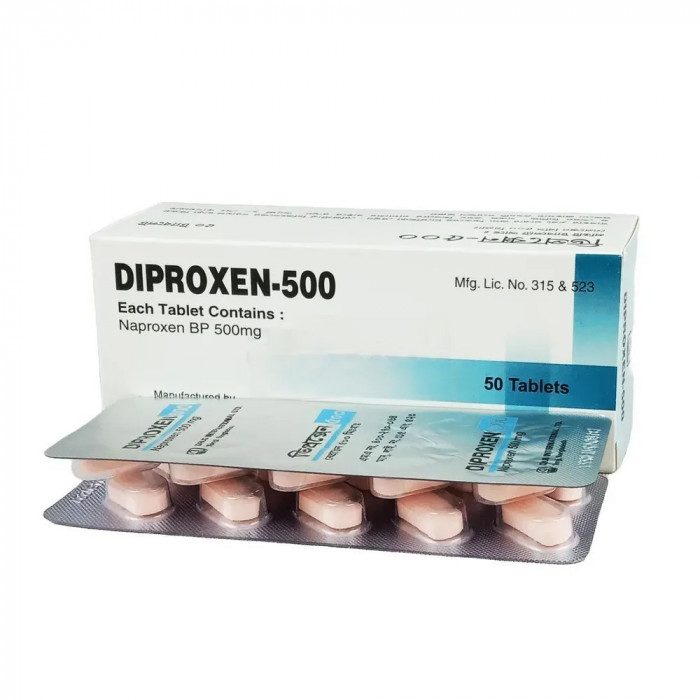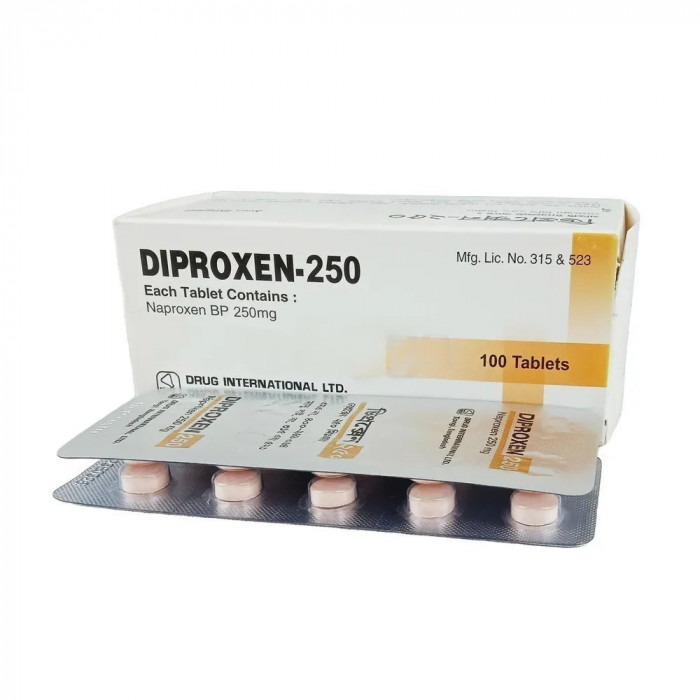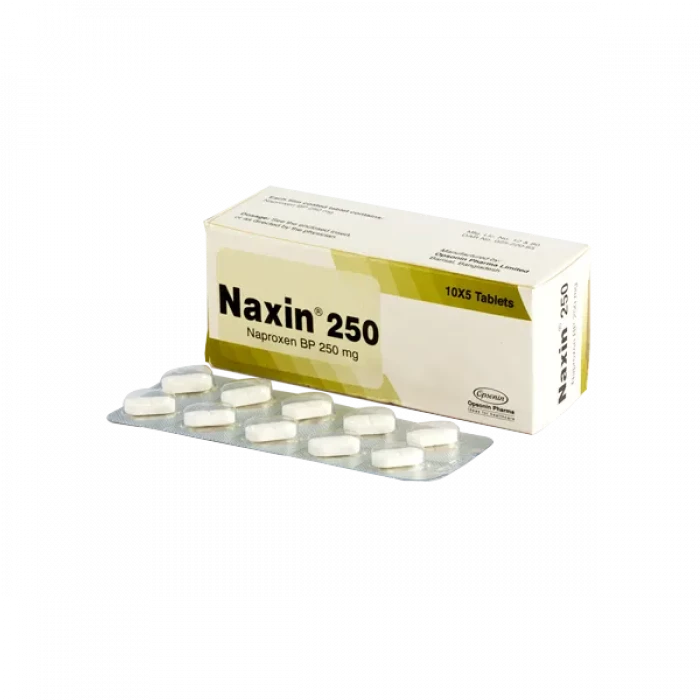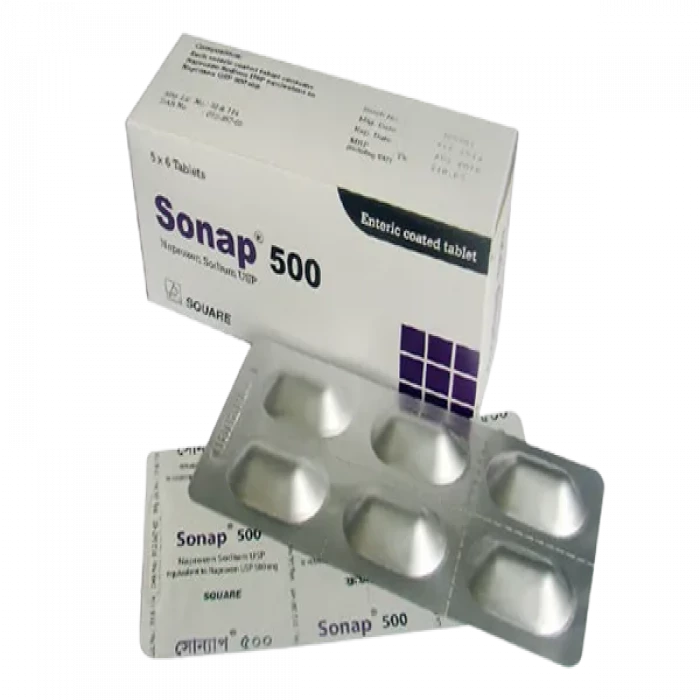
✔ 100% Authentic Product
👁️ Currently Viewing 2481
The primary component of a Napro 250mg Tablet is Naproxen. It is utilized to treat rheumatoid arthritis discomfort and inflammation. It works by preventing the chemical that causes pain and inflammation.
Children under the age of five who have had rheumatoid arthritis since birth should not use naproxen. To prevent stomach discomfort, use Napro 250mg Tablet with meals as prescribed by your doctor. For the term specified by your doctor, take this medication as directed. Before beginning therapy with the Napro 250mg Tablet, tell your doctor about all of your current medical conditions and previous medication use.
Discount
Price: ৳ 57
MRP:
৳
60
5%
Off

100% Genuine Products, Guaranteed

Safe & Secure Payments, Always

Fast, Secure & Efficient Delivery

Proper Packaging
 Cash on Delivery - All over Bangladesh
Cash on Delivery - All over Bangladesh Regular Delivery - 12-24 Hours, Dhaka City* Charge Tk.39-59
Regular Delivery - 12-24 Hours, Dhaka City* Charge Tk.39-59 Regular Delivery - 24-48 Hours, Other Cities* Charge Tk.99-110
Regular Delivery - 24-48 Hours, Other Cities* Charge Tk.99-110
🌙 রমযান অফার 🌙
 ফ্রি ডেলিভারিঃ - ৭৯৯ টাকা+ অর্ডারে, ঢাকা
শহরে
ফ্রি ডেলিভারিঃ - ৭৯৯ টাকা+ অর্ডারে, ঢাকা
শহরে ফ্রি ডেলিভারিঃ - ২৭৯৯ টাকা+ অর্ডারে, ঢাকার
বাহিরে
ফ্রি ডেলিভারিঃ - ২৭৯৯ টাকা+ অর্ডারে, ঢাকার
বাহিরে
📲 মোবাইল অ্যাপ অর্ডারে সাশ্রয় বেশী
-
Google Play Store থেকে ডাউনলোড
-
Apple Store থেকে ডাউনলোড
100% Genuine Products, Guaranteed
Safe & Secure Payments, Always
Fast, Secure & Efficient Delivery
Proper Packaging
 Cash on Delivery - All over Bangladesh
Cash on Delivery - All over Bangladesh Regular Delivery - 12-24 Hours, Dhaka City* Charge Tk.39-59
Regular Delivery - 12-24 Hours, Dhaka City* Charge Tk.39-59 Regular Delivery - 24-48 Hours, Other Cities* Charge Tk.99-110
Regular Delivery - 24-48 Hours, Other Cities* Charge Tk.99-110 ফ্রি ডেলিভারিঃ - ৭৯৯ টাকা+ অর্ডারে, ঢাকা
শহরে
ফ্রি ডেলিভারিঃ - ৭৯৯ টাকা+ অর্ডারে, ঢাকা
শহরে ফ্রি ডেলিভারিঃ - ২৭৯৯ টাকা+ অর্ডারে, ঢাকার
বাহিরে
ফ্রি ডেলিভারিঃ - ২৭৯৯ টাকা+ অর্ডারে, ঢাকার
বাহিরে- Google Play Store থেকে ডাউনলোড
- Apple Store থেকে ডাউনলোড
🌙 রমযান অফার 🌙
📲 মোবাইল অ্যাপ অর্ডারে সাশ্রয় বেশী
✅ Description:
Napro 250mg Tablet is a type of pain reliever known as a non-steroidal anti-inflammatory drug (NSAID). It is commonly used to reduce pain and inflammation in muscles and joints caused by conditions like osteoarthritis, rheumatoid arthritis, ankylosing spondylitis, cervical spondylitis, and acute gout. Arthritis is a condition that leads to joint swelling, pain, and stiffness that worsen over time.
The active ingredient in Napro 250mg Tablet is Naproxen, which works by blocking the action of an enzyme called cyclo-oxygenase (COX) in the body. This enzyme is involved in the production of certain chemical substances, such as prostaglandins, which contribute to pain and swelling. By inhibiting COX, Naproxen helps relieve pain and swelling associated with various types of arthritis.
It's important to take Napro 250mg Tablet as prescribed by your doctor. The dosage and frequency will be determined based on your specific medical condition. Some common side effects of Napro 250mg Tablet include indigestion, heartburn, stomach pain, nausea, headache, dizziness, drowsiness, bruising, itching, rash, and ringing in the ears. Most of these side effects are mild and will gradually resolve on their own. However, if they persist or worsen, it's advisable to consult your doctor.
If you have a known allergy to Napro 250mg Tablet or any other medications, inform your doctor. If you are pregnant or breastfeeding, it's important to let your doctor know before taking Napro 250mg Tablet Avoid consuming alcohol while using Napro 250mg Tablet as it may increase the risk of stomach bleeding. This medication may also increase the risk of severe heart problems, such as heart attack and stroke, which can be life-threatening. It should not be used by patients who have recently undergone or are scheduled to undergo heart bypass surgery. Napro 250mg Tablet also carries an increased risk of serious gastrointestinal conditions like stomach or intestinal bleeding, ulceration, and perforation, which can be fatal.
Safety Advices

Alcohol
UNSAFE
Alcohol should not be consumed with this medicine as it may increase the risk of stomach bleeding.

Pregnancy
CONSULT YOUR DOCTOR
Napro 250mg Tablet is often not advised to be used by pregnant women in the latter three months of pregnancy since it might damage the unborn child. It should only be used in cases where it is really required, such as when a woman is pregnant, planning a pregnancy, or is having trouble getting pregnant. Before using the medication, speak with your doctor.

Breastfeeding
CONSULT YOUR DOCTOR
Napro 250mg Tablet is not recommended for breastfeeding women. Consult your doctor before taking this medicine.

Driving
Napro 250mg Tablet can cause dizziness. Thus, if you experience such symptoms after taking this medicine, avoid driving.

Kidney
CONSULT YOUR DOCTOR
Napro 250mg Tablet is not recommended for use in patients with severe kidney disease. It should be used with caution in patients with kidney problems. Consult your doctor before taking this medicine.

Liver
CONSULT YOUR DOCTOR
Napro 250mg Tablet is not recommended for use in patients with serious liver disease. It should be used with caution in patients with liver problems. Consult your doctor before taking this medicine.
✔️ Uses of Napro 250mg Tablet
- Joint pains
- Rheumatoid Arthritis
- Menstrual cramp
✔️ How does Napro 250mg Tablet work?
The body's production of a chemical known as prostaglandin is inhibited by Napro 250mg Tablet. Pain and fever are examples of inflammatory symptoms brought on by prostaglandins. This anti-inflammatory effect is effective for lowering inflammation-related discomfort, stiffness, edema, and fever.
✔️ Side Effects of Napro 250mg Tablet
- Indigestion
- Heartburn
- Stomach pain
- Constipation
- Gas
- Vomiting
- Nausea
- Diarrhea
✔️ Quick Suggestions:
- Napro 250mg Tablet is used to provide relief from the pain associated with various types of arthritis such as spondylitis, rheumatoid, osteoarthritis, gout, and also menstrual pain.
- It's best to take it with or after meals to avoid stomach upset. Do not miss a dose or exceed the amount prescribed by your doctor.
- This medicine should not be used if you are pregnant, planning on becoming pregnant, or breastfeeding. Your baby could be seriously harmed by this medication.
- If you become pregnant while taking Napro 250mg Tablet, stop taking it immediately and consult your doctor. Also, inform your doctor about all other medicines that you take and your complete medical history.
- Do not take any medicine on your own without confirming with your doctor during the treatment.
- Napro 250mg Tablet should not be given to children under 16 years of age without a doctor’s advice.
- Heartburn, indigestion, chest pain, constipation, and nausea/vomiting may occur in some individuals with the use of this medicine. Inform your doctor if these effects bother you or do not go away.
- If you experience sleepiness or blurred vision after taking Napro 250mg Tablet, it is recommended to avoid driving, operating heavy machinery, or performing any such tasks that require mental alertness.
- It is also advised to quit alcohol intake and smoking for better treatment.
✔️ Indication of Napro 250mg Tablet
Naproxen is used to relieve pain in the following conditions:
- Muscles, joints, and tendons problems such as strains, gout, ankylosing spondylitis (pain and stiffness in the neck and back), or arthritis
- Painful heavy periods and bleeding due to insertion of an intrauterine device (women)
- Migraine headache
- Rheumatoid arthritis (children)
✔️ Pharmacology
Naproxen is indeed a non-steroidal anti-inflammatory drug (NSAID) that possesses anti-inflammatory, analgesic (pain-relieving), and antipyretic (fever-reducing) properties. It is commonly used to alleviate pain, reduce inflammation, and lower fever. When taken orally, Naproxen is rapidly absorbed from the gastrointestinal tract, and it has a high bioavailability of approximately 95%. This means that a significant portion of the administered dose is effectively absorbed into the bloodstream and can exert its therapeutic effects.
✔️ Dosage & Administrations of Napro 250mg Tablet
The recommended dosage of Naproxen for various conditions is as follows:
- Rheumatoid arthritis, osteoarthritis, and ankylosing spondylitis: The usual dose is 500-1000 mg per day, divided into two separate doses after meals.
- Pain, primary dysmenorrhea, acute tendinitis, and bursitis: The recommended initial dose is 500 mg, followed by 500 mg every 12 hours or 250 mg every 6-8 hours. The total daily dose should not exceed 1250 mg initially, and it should not exceed 1000 mg thereafter.
- Acute gout: An initial dose of 750 mg is recommended, followed by 250 mg every 8 hours until the gout attack subsides.
It's important to note that these dosage guidelines are general recommendations, and the actual dosage may vary depending on individual factors and the advice of a healthcare professional. It's always best to follow the specific instructions provided by your doctor or pharmacist.
✔️ Interaction
- Interactions with other painkillers: Napro 250mg Tablet may interact with other painkillers such as ibuprofen, diclofenac, paracetamol, and aspirin. It's important to use caution and consult a healthcare professional if you are taking any of these medications concurrently.
- Interactions with high blood pressure-lowering medicines: Napro 250mg Tablet can interact with medications used to lower high blood pressure, such as propranolol, enalapril, cilazapril, losartan, candesartan, and eprosartan. Close monitoring of blood pressure is recommended when using these medications together.
- Interactions with water pills (furosemide): Napro 250mg Tablet may interact with furosemide, which is a medication used as a diuretic (water pill). Concomitant use requires careful monitoring of kidney function and fluid balance.
- Interactions with blood thinners: Napro 250mg Tablet can interact with blood thinners like heparin, warfarin, and clopidogrel, increasing the risk of bleeding. Regular monitoring of blood clotting parameters is essential in such cases.
- Interactions with anticonvulsant medications (phenytoin): Napro 250mg Tablet may interact with phenytoin, a medication used to treat seizures. Co-administration may affect the blood levels of phenytoin and require dosage adjustments.
- Interactions with antidiabetic drugs: Napro 250mg Tablet can interact with antidiabetic medications like glimepiride and glipizide, affecting blood sugar control. Regular monitoring of blood glucose levels is advised when using these medications together.
- Interactions with antibiotics: Napro 250mg Tablet may interact with antibiotics like moxifloxacin and ciprofloxacin, potentially increasing the risk of side effects. It's important to consult a healthcare professional if using these medications simultaneously.
- Interactions with HIV/AIDS medicines (Zidovudine): Napro 250mg Tablet can interact with Zidovudine, a medication used in the treatment of HIV/AIDS. The combination may increase the risk of side effects and require monitoring.
✔️ Contraindications
Additionally, individuals who have experienced asthma, urticaria (hives), or allergic-type reactions after taking aspirin or other non-steroidal anti-inflammatory drugs (NSAIDs) should not take naproxen.
Furthermore, naproxen is contraindicated for the treatment of perioperative discomfort in the context of coronary artery bypass graft (CABG) surgery. This means that it should not be used to manage pain during or immediately after this surgical procedure.
✔️ Pregnancy & Lactation
Naproxen is classified as a pregnancy category C by the US Food and Drug Administration. So, unless the potential benefits to the other outweigh the potential hazards to the unborn, Naproxen should be avoided during pregnancy and nursing.
✔️ Precautions & Warnings
- If you have an allergy to Napro 250mg Tablet or any other medications, it is important to inform your doctor. Pregnant women, especially in the third trimester, are advised not to take Napro 250mg Tablet as it may potentially harm the baby. Therefore, if you are pregnant or breastfeeding, it is recommended to consult a doctor before taking this medication.
- Elderly patients are at a higher risk of experiencing gastrointestinal bleeding problems, so the doctor may need to adjust their dosage accordingly. It is important to avoid consuming alcohol while taking Napro 250mg Tablet as it can increase the risk of stomach bleeding.
- Napro 250mg Tablet may also increase the risk of severe heart problems, such as myocardial infarction (heart attack) and stroke, which can be life-threatening. If you notice any signs of bleeding from the rectum (black, sticky stools or bloody stools), blood in vomit, or stomach pain spreading to the back, it is important to stop taking Napro 250mg Tablet immediately and seek medical attention.
- Patients who have recently undergone heart bypass surgery or are scheduled for surgery should not use Napro 250mg Tablet. It also carries an increased risk of severe gastrointestinal conditions, including bleeding, ulceration, and perforation of the stomach or intestines, which can be fatal.
- If you experience weight loss, diarrhea, pain, or vomiting while taking Napro 250mg Tablet, it is important to stop the medication and consult a doctor immediately, as these could be signs of worsening Crohn's disease or ulcerative colitis (inflammation of the digestive tract). It is important to seek medical advice promptly in such cases.
✔️ Storage Conditions
Keep the temperature below 30°C and away from light and moisture. Keep out of children's reach
⚠️Disclaimer:
At ePharma, we’re committed to providing accurate and accessible health information. However, all content is intended for informational purposes only and should not replace medical advice from a qualified physician. Please consult your healthcare provider for personalized guidance. We aim to support, not substitute, the doctor-patient relationship.




